Expanse will provide efficiencies for care teams, improve the coordination of care for patients and support enterprise growth
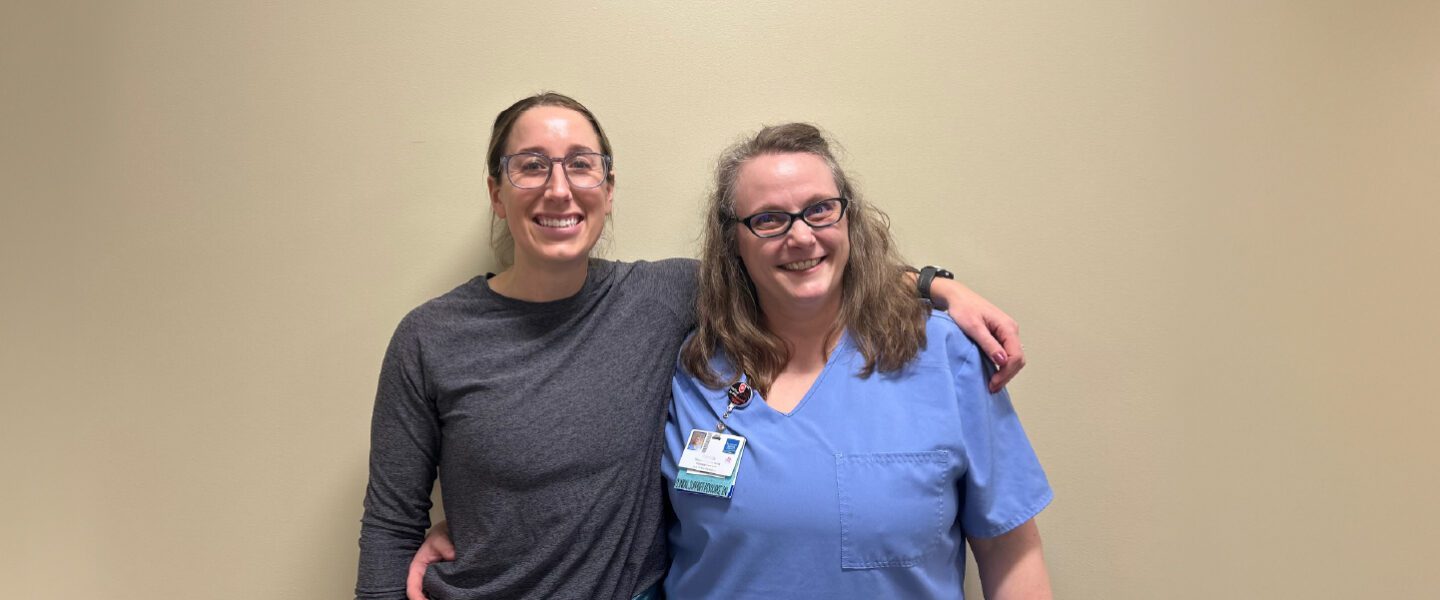
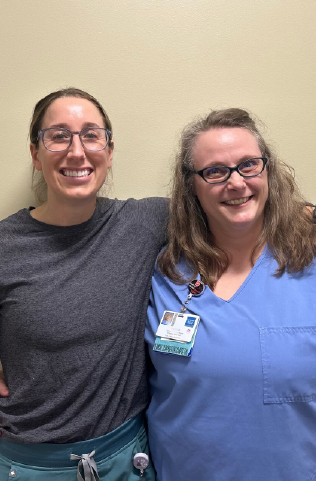
An improved electronic health records system used across care teams is enhancing patient care from admission through discharge.
The updated healthcare technology platform known as Expanse was implemented in three New Hampshire hospitals last year and expanded to six facilities in North Florida in 2024. Its rollout will continue across the enterprise through the coming years.
Replacing the aging MEDITECH Magic EHR platform, Expanse was developed by MEDITECH and is being implemented by HCA Healthcare. Designed to create efficiencies and improve the coordination of care for our patients, Expanse captures physician orders and documentation and transmits information across care teams. The cloud-hosted platform also gives nurses convenient access to patient information – such as which medications to administer and dosages – via cell phones or other mobile devices.
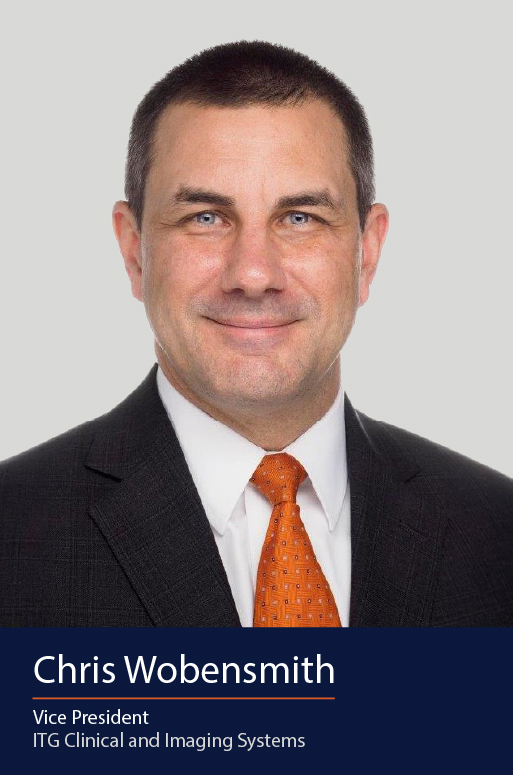
Jake O’Shea, MD, HCA Healthcare vice president and chief health information officer and the executive sponsor for the Expanse program, describes it as an exciting, modern platform.
“We are not only working to implement this technology platform, but also to optimize it and improve it as we go, so that it really enhances the care delivery experience for our nurses, physicians and other caregivers. It also optimizes the quality of care that we can deliver to our patients. That’s the end goal that we’re looking for,” he says.
Chris Wobensmith, vice president of ITG Clinical and Imaging Systems, wants colleagues to know that Expanse plays a critical role in patient care.
“Expanse is the foundation of our future plans as an organization,” Chris says. “All of the innovation that we’re planning to do moving forward is predicated upon having an electronic health record that can connect our technologies.”
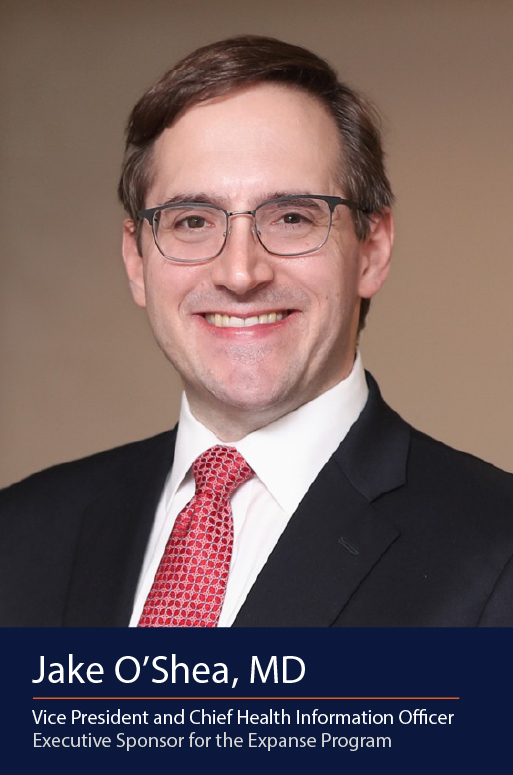
Improving bedside care and data collection
Expanse’s modern interface comes with key improvements. Applied Programming Interfaces (APIs) allow HCA Healthcare to connect Electronic Medical Records (EMRs) to more advanced technology tools, even if MEDITECH didn’t build them.
For example, another partner might provide an ambient listening tool that records a conversation between a physician and their patient and transfers it to a medical record note that the physician can then review, edit and document.
“Instead of Meditech having to build additional tools within the core of its software, another partner can build it and then Meditech, through APIs, can can send it into Expanse,” Dr. O’Shea explains. “That is one of the cool features of this program. It gives us a lot more flexibility with some of the innovation that we’re developing and implementing.”
Expanse’s reach is hospital wide — admissions, labs, pharmacies, emergency and operating rooms and inpatient wards.
“It impacts anybody in the facility that uses the electronic health record, which is pretty much everybody,” Chris says.
Documentation is a very important part of our job, and this has made it so much quicker. I would much rather spend more time doing patient care than documentation.— Jennifer Zubkus, RN of the Intensive Care Unit of Portsmouth Regional Hospital in New Hampshire
Its mobile application is a great benefit to nurses, allowing them more time at the bedside. Patricia “Trish” Yaxley, RN, CCRN and Jennifer Zubkus, RN of the Intensive Care Unit of HCA Healthcare’s Portsmouth Regional Hospital in New Hampshire where Expanse was first tested were among its first users.
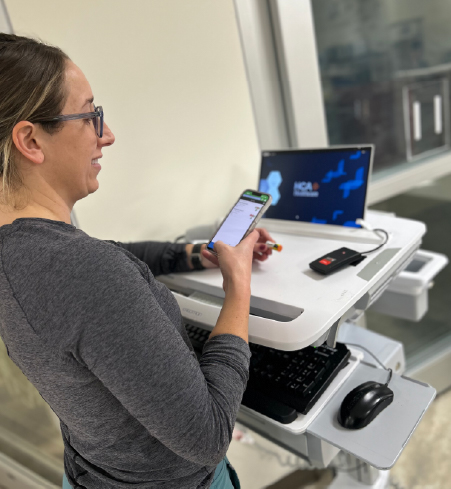
Trish says it initially took time to adapt initially, but they have hit their stride and are experiencing better functionality.
“We can do everything from Expanse on our phones,” Jennifer says of her nurse colleagues. “We can print lab labels with our new portable printers. We can scan medications. We can look at up-to-date labs and any readings and text that to a doctor without having to log onto a computer. I can do it when I’m walking in between patients. Going room-to-room, I can be looking at results.”
Jennifer adds that Expanse gives her more time with patients.
“Documentation is a very important part of our job, and this has made it so much quicker. I would much rather spend more time delivering patient care than documentation,” she says.
Trish and Jennifer also provided early feedback as Expanse was implemented throughout their hospital. Learnings from each live facility have been documented, prompting improvements.
“The more sites we bring on, the more we learn,” Dr.O’Shea says. “We try to ingest as many of the lessons learned from each of these implementations and bring them to our future go-live plans.”
Another major benefit of Expanse is that it establishes a standardized way of capturing data, which can be used to improve patient outcomes.
There was previously more variation in medical recordkeeping, which made it more difficult to identify trends. For example, one hospital might refer to a complete blood count test as a CBC, while other facilities might use another term.
“What’s great about Expanse is that we have more ability to standardize from the start. That means the data we’re going to get out of it is going to be incredibly powerful once we’re at an enterprise level,” Dr. O’Shea says.
The universal message that I’ve heard from our colleagues in the hospitals and in our divisions is, ‘This tool has so much promise and so much potential, and we’re so excited to have it in our hands.’ And that drives me to keep going every day.— Jake O’Shea, MD, HCA Healthcare vice president and chief health information officer and the executive sponsor for the Expanse program
Embracing change, providing support
The implementation of such an impactful program across the enterprise couldn’t be successful without the efforts of hundreds of colleagues. A dedicated Change Management Team helped colleagues adjust to the many ways their work would be done differently. Additional Change Champions across clinical disciplines who helped colleagues understand the system and learn new workflows.
Dr. O’Shea says people are more comfortable using technology today, compared to 20 years ago when health records initially went from paper to electronic documentation. People today use technology in their daily lives, which has helped ease the transition to using Expanse.
He also credits the Care Transformation and Innovation Team in leading its launch. There are about 600 colleagues working full time on Expanse, building the program and looking at ways to optimize it.
“There’s a team of educators and a team of implementers and a team of builders who are just incredibly dedicated people who wear these successes and opportunities on their sleeves,” he says. “They really are a group of dedicated, incredibly hardworking people who are toiling day and night when we do these implementations to make this tool as useful, as powerful and as safe as possible for our care teams.”
Expanse will continue to launch in facilities across the enterprise. Dr. O’Shea says Expanse teams continue to learn and make improvements with each launch and he credits their success to crucial clinical team partnerships.
“The universal message that I’ve heard from our colleagues in the hospitals and in our divisions is, ‘This tool has so much promise and so much potential, and we’re so excited to have it in our hands.’ And that drives me to keep going every day,” he says.


